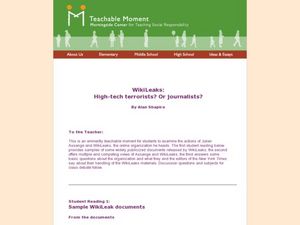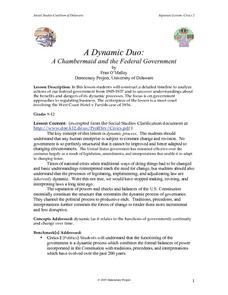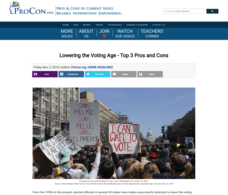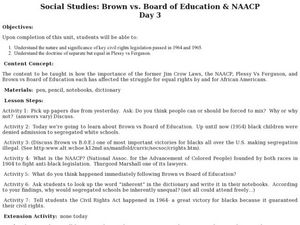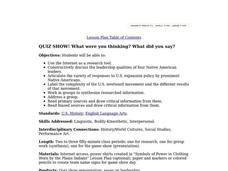Curated OER
Television Goes Digital
Students explore the difference between analog and digital televisions. They examine how the technology works and the impact of television through history. They also compare older television sets to ones found today.
Curated OER
Alexis de Tocqueville’s America
Students analyze de Tocqueville's America. In this democratic history lesson, students use primary sources to determine what de Tocqueville found to be so unique in the America. Students analyze artifacts, maps and documents through...
Curated OER
In Remembrance of George Washington
Students explore the contributions of George Washington. For this early American history lesson, students analyze the provided eulogy for George Washington written by Henry Lee and then write their eulogies for the first president.
Curated OER
WikiLeaks: High-tech terrorists? Or Journalists?
Young scholars investigate the credibility of WikiLeaks. In this history lesson, students read three WikiLeak articles, then answer questions that relate to each article.
Curated OER
Little Kinnakeet Lifesaving/Coast Guard Station
Students complete a variety of activities that go along with the study of and possible field trip to the Little Kinnakeet Lifesaving/Coast Guard Station on the Cape Hatteras National Seashore, NC.
Curated OER
The Role of the United Nations in Postwar Iraq
Students study the history of the United Nations and answer study questions regarding the role of the UN in present day post-war Iraq.
Curated OER
Uniform Blues
Fourth graders explore what the U.S. Constitution is and why it is important, the purpose of the state constitution, and its relationship to the U.S. Constitution and the similarities and differences among federal, state and local...
Curated OER
All Men Are Created Equal
High schoolers discuss the statement "All Men Are Created Equal". Using the internet, they research events in history in which this statement has been ignored and supported by the government. They use this information to write an essay...
Curated OER
A Dynamic Duo
Pupils engage in the research of history that surrounded the actions of the federal government during the years from 1907-1937. The focus of the lesson is upon the regulations imposed on business during the time and how it effected the...
Curated OER
The End of United States' Occupation of Japan
Ninth graders examine and discuss reasons for end of U.S. occupation of Japan in 1952, locate surrounding Asian countries on map, explore changes to Japan after World War II, and discuss how changes in Japan impacted other countries.
Curated OER
Glidden's Patent Application for Barbed Wire
Students discuss the invention of barbed wire and how it affected various groups of peoples in the U.S. after its invention.
Curated OER
North Korea's Power Play
Young scholars research a number of websites to see how North Korea's leaders have shaped the country. They investigate Korea's ancient history and culture.
Curated OER
Social Studies: Debating Aid to Micronesia
Students simulate a debate about continued U.S. aid to the Federated States of Micronesia. In two large groups, they research the history of Micronesia and how it was affected by colonization and trusteeship. After the debate, students...
Curated OER
Push/Pull factors in Immigration
Students explore the push/pull factors experienced by immigrant families. They interview a parent and an American about their family's immigration history. Students write a summary of the interview and compare the push/pull factors of...
Administrative Office of the US Courts
Texas v. Johnson
Which right does the Constitution weigh more heavily: the sanctity of the American flag as a symbol of national unity, or the right to burn the flag in protest? The 1989 Supreme Court case of Texas v. Johnson explores a...
Constitutional Rights Foundation
Educating About Immigration The DREAM Act
Group members role play state legislators, supporters of and opponents to the The DREAM Act (Development, Relief, and Education for Alien Minors). After listening to the arguments put forth for and against the immigration...
ProCon
Voting Age
Should age matter when it comes to voting? Scholars read an article discussing the pros and cons of lowering the voting age to 16. They then consider both the advantages and disadvantages of having younger voters. After thinking about...
NPR
Same-Sex Marriage
The battle over same-sex marriage is a prevalent issue in the United States, and a valuable topic to be discussed in your social studies classroom. Here is a basic outline of introductory questions, focus questions, vocabulary, and media...
Stanford University
King Philip's War
King Philip's War was the crescendo of a violent period between the Pequot and English colonists. Using documents from English settlers, including a contemporary report on the conflict, learners explore the little-known period. They then...
Humanities Texas
A President's Vision: Lyndon Baines Johnson
Learners take a closer look at the presidency of Lyndon B. Johnson, including the Great Society and the passage of the Voting Rights Act, through image analysis and primary source worksheets.
Curated OER
Presidents of the United States
In this social studies worksheet, students find the names of the presidents and the answers are accessed at the link at the bottom of the page.
Curated OER
Brown vs. Board of Education and NAACP
Eleventh graders examine the issues surrounding Brown vs. Board of Education. In this American Government lesson, 11th graders study the key civil rights legislation passed in 1964 and 1965.
Curated OER
Jackie Steals Home
Students read articles relating to Jackie Robinson's breaking of the racial barrier in professional baseball. This leads to a deeper exploration of racism in the United States. They use a variety of worksheets imbedded in this plan to...
Curated OER
QUIZ SHOW! What were you thinking? What did you say?
Young scholars participate in a game show to share the information they have uncovered about the US expansion policy and how it affected Native Americans.





